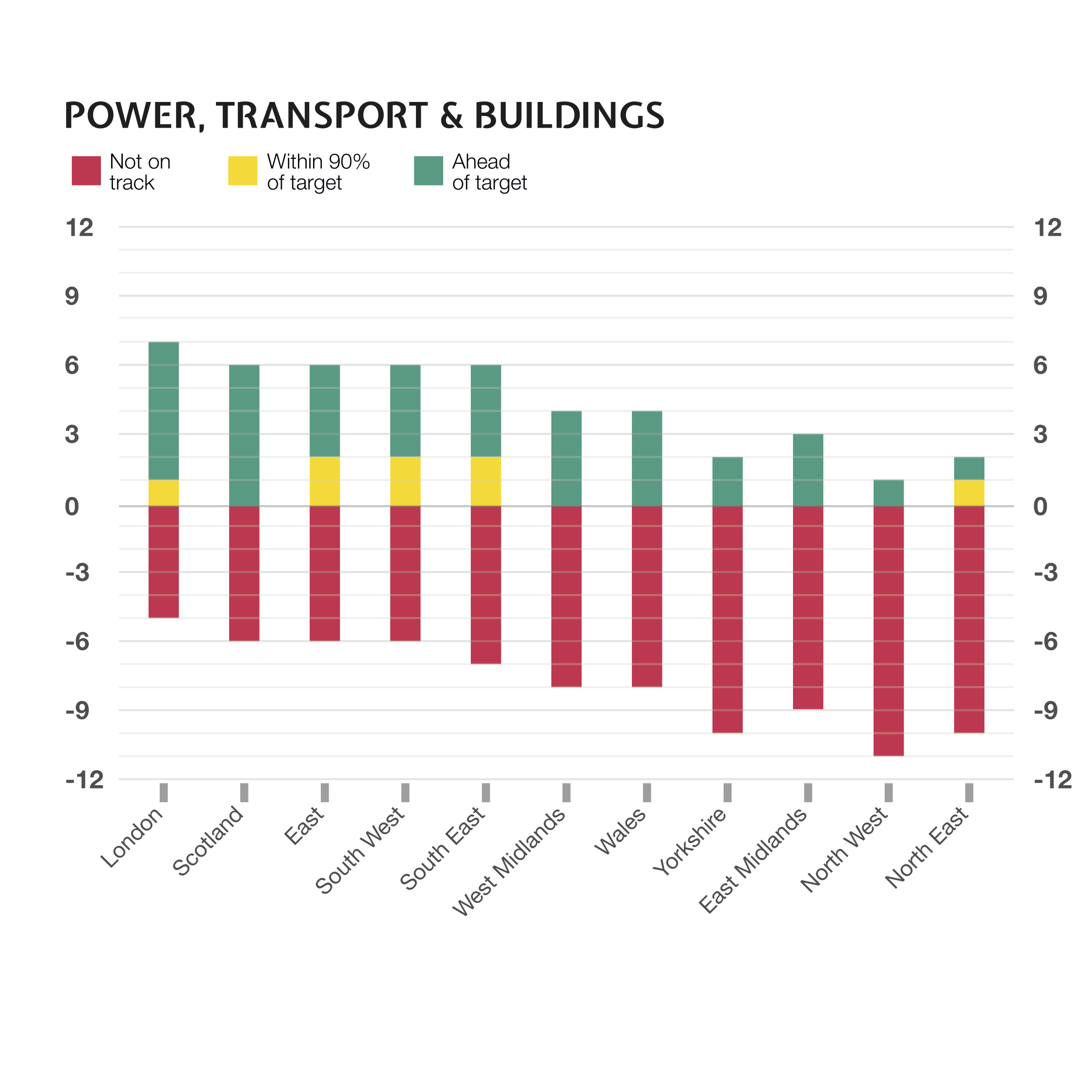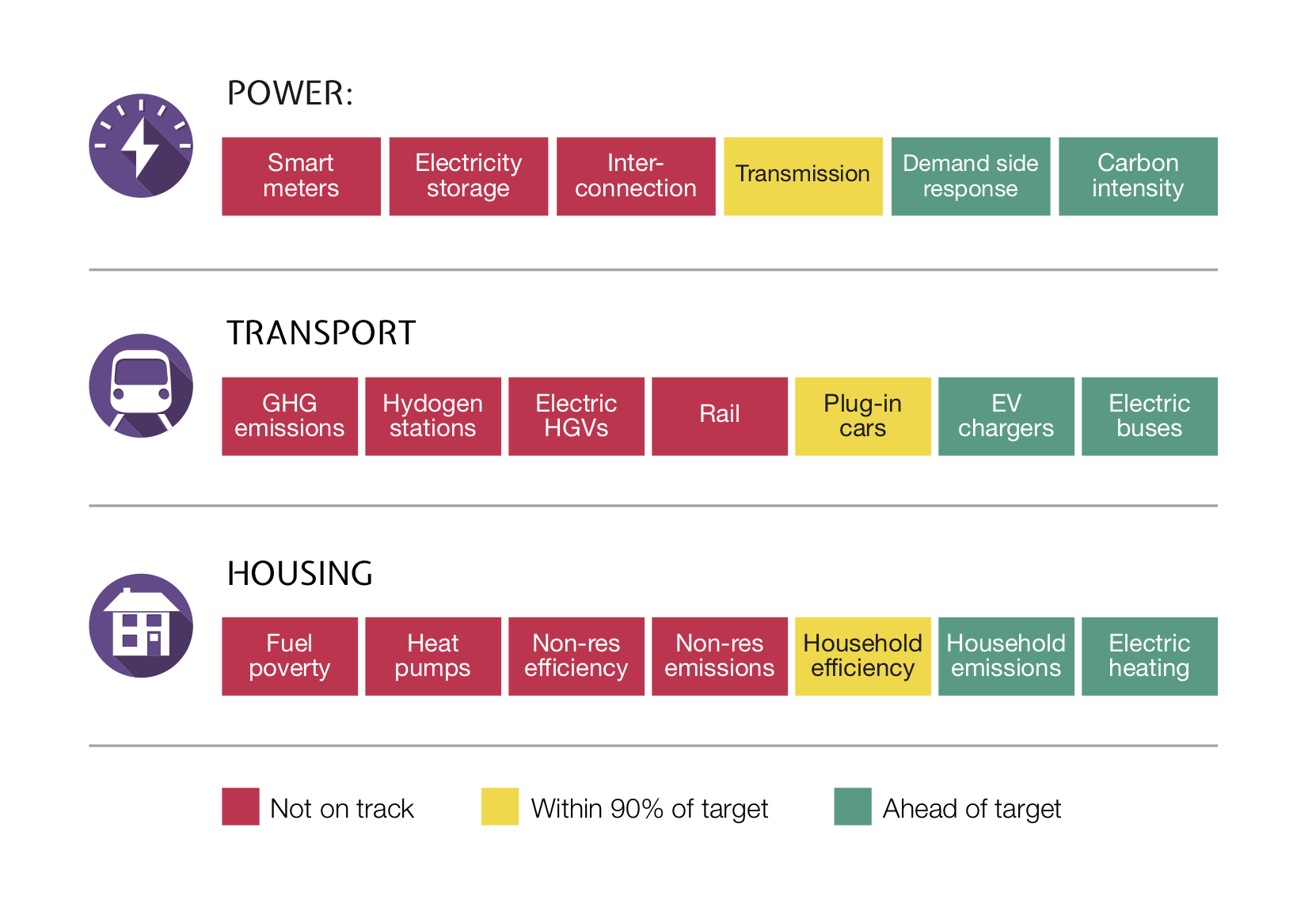-
Researchers from Imperial College London and E4tech warn of a two-tier economy emerging as Britain goes through an ‘energy revolution’.
-
Revolution taking place in UK energy system could unlock new growth, lower energy bills and smarter living but many in society will lose out.
-
Report reveals regional divides for the first time as communities and businesses in some areas power ahead while others risk being left behind.
-
London and Scotland are pulling ahead while the North of England and East Midlands lag furthest behind.
The research shows that businesses and families in London and Scotland are better placed to take advantage of the benefits of the ‘energy revolution’, including cheaper energy bills, electric vehicles and smart appliances. Meanwhile, the North of England and East Midlands lag furthest behind.
Conducted independently by researchers from Imperial College London and E4tech, facilitated by Imperial Consultants and commissioned by Drax Group, the report breaks down the energy revolution into 20 metrics for the power, transport and buildings sectors, to provide a barometer of national and regional progress. Achievement against each of these metrics is scored as ‘not on track’, ‘within 90% of target’ or ‘ahead of target’.
Commenting on his team’s findings, Imperial’s Dr Iain Staffell said:
“The country is going through an energy revolution. We are creating an energy system which will power our future economy and help tackle climate change.
“But, our research reveals that Britain is at risk creating a two-tier economy, leaving millions of families and businesses less well equipped to enjoy cheaper bills and better health outcomes. Our concern is they will not be offered the same opportunities as people living in regions which are modernising their energy infrastructure.”
Responding to the findings Will Gardiner, Drax Group CEO, said:
“Great Britain needs more secure, clean energy to compete in the future economy. There is an energy revolution underway which will deliver it – but this report uncovers worrying regional divides as we go through that transition.
“Drax is already working hard to enable a zero carbon, lower cost energy future for all. We will work with all our partners including governments to ensure no-one is left behind through the energy revolution.”
Who’s ahead and behind in the energy revolution?
Differences in levels of government investment, local policies and average household income have resulted in more affluent regions leading in the energy transition.
London leads progress jointly with Scotland because its transport system is the country’s greenest. As public transport, walking and cycling are more dominant in London, a Londoner’s carbon footprint from transport is up to 2.5 times less than residents in other regions. The capital also receives 45% of national funds for rail electrification, resulting in the country’s lowest carbon emissions from rail.
It is also cheaper, on average, to own an electric car in London than in any other part of the country. This is due to the average London driver travelling shorter distances and the exemption of electric vehicles (EV) from London’s Congestion Charge.
Scotland leads in the energy revolution with London due to its successful shift from fossil fuels to renewable generated electricity. The number of EV charging points in Scotland is also high compared to the number of vehicles: despite the low population density, the average Scottish household is around 2km from a charging point, but with the lifetime cost of running an EV being the highest in Scotland and Wales, this is affecting uptake in these areas.
Residential homes in leading regions London, Scotland and the East are also more energy efficient, and more likely to score high A-C Energy Performance Certificate (EPC) ratings, and have fewer buildings rated F and G.
By comparison, all of the regions lagging behind, including Wales, Yorkshire, the East Midlands and the north of England suffer from particularly low EPC ratings. The cost of heating, combined with lower average incomes in these areas mean that fuel poverty rates are particularly high. As the country transitions to more electric heating in future, this is likely to result in increasing energy bills in these regions unless homes can be made more energy efficient, or the cost of electric heating can be reduced, particularly for vulnerable residents.
Which sectors are ahead in the energy revolution?
The research also highlights sector differences. While work to reduce the carbon impact of the power sector is on track due to the closure of coal stations and growth in renewables, work to electrify heating, improve the energy efficiency of homes and electrify the railway is falling behind.
ENDS
Media contacts
Jenny Runnacles
E: [email protected]
T: 07747 561 760
Rachel Adeyinka
E: [email protected]
T: 07940 177 999
Editor’s Notes
- ‘Energising Britain’ report was commissioned by Drax Group and conducted independently by academics from Imperial College London, and consultants from E4tech, facilitated through the College’s consultancy company – Imperial Consultants.
- The metrics used to assess the state of transition in the energy system are presented as a ‘barometer’. Each barometer sets out three points:
- The end target for the transformation for the target year in the scenario (e.g. total number of EV charging points in 2030)
- The current state of transformation (e.g. number of charging points operational), and
- An indication of where we would have to be to meet the 2030 target (e.g. number of charging points in 2018).
- The end target for transformation are based on 2030 targets from the National Grid Future Energy Scenarios (FES), the Department for Business, Energy and Industrial Strategy (BEIS) and the Committee on Climate Change (CCC)
- The geographical scope refers to the 11 regions of Great Britain (Scotland, Wales, and 9 in England). Northern Ireland was excluded due to lack of available data.
- The metrics examined by sector include:
- The Power System. This section includes national and regional barometers for 1. Carbon intensity of grid electricity 2. Storage deployment 3. Transmission capacity and 4. Smart meter roll-out. A regional barometer is not presented for interconnection as this is a country-to-country issue.
- Energy in Transport. This section includes national and regional barometers for 1. GHG emissions reductions 2. Plug-in vehicles in the car fleet 3. Electric vehicle charging points 4. Hydrogen refuelling stations 5. Electric and hydrogen buses and 6. Ultra-low emission heavy goods vehicles (HGVs). A regional barometer is not represented for rail emissions; this was examined across the entire British rail industry.
- Energy in Buildings. This section includes national and regional barometers for 1. Energy efficiency by energy performance certificate (EPC) ratings 2. Electrification of heating and 3. Heat Pump Deployment. A regional barometer is not represented for fuel poverty as there were no milestones available for 2018.
- Progress in the industrial sector is not examined due to a lack of data.
- View the report: drax.com/energisingbritain
About Drax
Drax Group plc plays a vital role in helping change the way energy is generated, supplied and used. Its 2,300-strong staff operate across three principal areas of activity – electricity generation, electricity sales to business customers and compressed wood pellet production.
The Group includes:
Drax Power Ltd, which operates the largest power station in the UK, based at Selby, North Yorkshire and supplies six percent of the country’s electricity needs. The energy firm converted from burning coal to become a predominantly biomass-fuelled electricity generator. Drax is the biggest renewable generator in the UK and the largest decarbonisation project in Europe.
Haven Power, based in Ipswich, supplies electricity to large Industrial and Commercial sector businesses.
Opus Energy, based in Oxford, Northampton and Cardiff, provides electricity and gas to small and medium sized (SME) businesses.
Drax Biomass, is based in the US and manufactures compressed wood pellets produced from sustainably managed working forests, supplying fuel used by Drax Power Station in North Yorkshire to generate flexible, renewable power for the UK’s homes and businesses.
For more information visit www.drax.com/us
Imperial Consultants provide access to over 4,000 research-active expert academics and Imperial College London’s state of the art facilities to deliver innovative solutions to meet the business needs of industry, government and the third sector. Founded in 1990, Imperial Consultants is the wholly owned consultancy company of Imperial College London.
E4tech is a strategic energy consultancy. Founded in 1997 the firm provides technically informed insight on the energy transition and its implications on companies, governments and investors.










